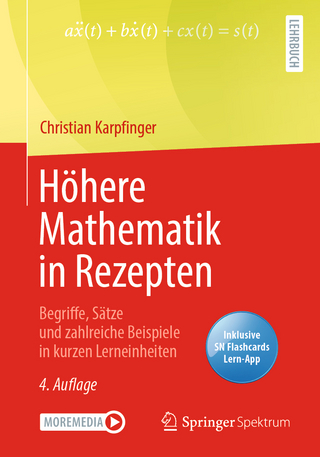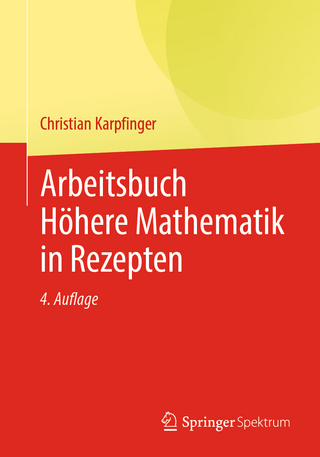Topics in Analytic Number Theory
Springer-Verlag Berlin and Heidelberg GmbH & Co. K
978-3-540-05447-4 (ISBN)
Lese- und Medienproben
- Titel ist leider vergriffen;
keine Neuauflage - Artikel merken
Analytic tools Chapter 1. Bernoulli polynomials and Bernoulli numbers ...1 1. The binomial coefficients ...1 2. The Bernoulli polynomials ...4 3. Zeros of the Bernoulli polynomials ...7 4. The Bernoulli numbers ...9 5. The von Staudt-Clausen theorem ...10 6. A multiplication formula for the Bernoulli polynomials ...
I. Analytic tools.- 1. Bernoulli polynomials and Bernoulli numbers.- 1. The binomial coefficients.- 2. The Bernoulli polynomials.- 3. Zeros of the Bernoulli polynomials.- 4. The Bernoulli numbers.- 5. The von Staudt-Clausen theorem.- 6. A multiplication formula for the Bernoulli polynomials.- 2. The Euler-MacLaurin sum formula.- 7. Use of the Bernoulli polynomials.- 8. Fourier expansions of the Bernoulli polynomials.- 9. Sums of reciprocal powers.- 10. The generating function of the Bernoulli numbers.- 11. Tangent and cotangent coefficients.- 12. A theorem by Frobenius about the numerators of the Bernoulli numbers.- 13. The generating function of the Bernoulli polynomials.- 14. The secant coefficients or Euler numbers.- 15. Stirling's formula.- 16. A further application.- 17. A historical remark.- 3. The ?-function and Mellin's theorem.- 18. Definition of the ?-function.- 19. Functional equations of ?(s).- 20. Application of the Euler-MacLaurin sum formula.- 21. Asymptotic behavior of ?(s).- 22. A lemma.- 23. The Mellin formula.- 24. Hankel's formula.- 25. An application to Bessel functions.- 26. The Fourier integral.- 27. Mellin's formulae.- 28. Some further examples of Mellin's formulae.- 4. The Phragmen-Lindelof theorem.- 29. The main theorem.- 30. A theorem of the Phragmen-Lindelof type for subharmonic functions.- 31. The Poisson integral formula for a strip.- 32. A lemma.- 33. A generalization of the Phragmen-Lindelof theorem.- 34. Applications to the ?-function.- 5. The Poisson sum formula and applications.- 35. The theorem.- 36. Application: A transformation formula for a ?-function.- 37. Lipschitz's formula.- II. Special functions.- 6. The Riemann ?-function.- 38. Definition of the ?-function and its analytic continuation.- 39. Two special integrals.- 40. Riemann's functional equation for ? (s).- 41. Another proof for the functional equation of ? (s).- 42. Connection between the ?-function and a ?-function.- 43. Estimation of ? (s) in a vertical strip.- 7. About the prime-number theorem and the zeros of the ?-function.- 44. The Euler product.- 45. The borders of the critical strip are free of zeros of ? (s).- 46. Preparation for the proof of the prime-number theorem.- 47. A lemma.- 48. Expression of a function ?(x) connected with ? (x) by means of an integral.- 49. Some estimates for ?(s), ?'(s), 1/? (s).- 50. The prime-number theorem.- 51. The error term in the prime-number theorem.- 52. Caratheodory's lemma.- 53. Application of Caratheodory's lemma.- 54. The error term r (x).- 55. Existence of infinitely many non-trivial zeros.- 56. Additional remarks.- 57. Dirichlet series and the best order of the error term in the prime number theorem.- 8. The Eisenstein series.- 58. Definition of the Eisenstein series and of ? (u).- 59. Expansion of ? (u) in a Laurent series.- 60. Lambert series.- 61. Some arithmetical consequences.- 62. Modular forms.- 63. Definition of G2 (?1, ?2).- 64. The modular invariance of G2 (?1, ?2).- 65. Dedekind function ? (?) and the discriminant ?(?).- 9. The transformation of log ?(?) and the theory of the Dedekind sums.- 66. A formula of Iseki.- 67. Application of Iseki'I. Analytic tools.- 1. Bernoulli polynomials and Bernoulli numbers.- 1. The binomial coefficients.- 2. The Bernoulli polynomials.- 3. Zeros of the Bernoulli polynomials.- 4. The Bernoulli numbers.- 5. The von Staudt-Clausen theorem.- 6. A multiplication formula for the Bernoulli polynomials.- 2. The Euler-MacLaurin sum formula.- 7. Use of the Bernoulli polynomials.- 8. Fourier expansions of the Bernoulli polynomials.- 9. Sums of reciprocal powers.- 10. The generating function of the Bernoulli numbers.- 11. Tangent and cotangent coefficients.- 12. A theorem by Frobenius about the numerators of the Bernoulli numbers.- 13. The generating function of the Bernoulli polynomials.- 14. The secant coefficients or Euler numbers.- 15. Stirling's formula.- 16. A further application.- 17. A historical remark.- 3. The ?-function and Mellin's theorem.- 18. Definition of the ?-function.- 19. Functional equations of ?(s).- 20. Application of the Euler-MacLaurin sum formula.- 21. Asymptotic behavior of ?(s).- 22. A lemma.- 23. The Mellin formula.- 24. Hankel's formula.- 25. An application to Bessel functions.- 26. The Fourier integral.- 27. Mellin's formulae.- 28. Some further examples of Mellin's formulae.- 4. The Phragmen-Lindelof theorem.- 29. The main theorem.- 30. A theorem of the Phragmen-Lindelof type for subharmonic functions.- 31. The Poisson integral formula for a strip.- 32. A lemma.- 33. A generalization of the Phragmen-Lindelof theorem.- 34. Applications to the ?-function.- 5. The Poisson sum formula and applications.- 35. The theorem.- 36. Application: A transformation formula for a ?-function.- 37. Lipschitz's formula.- II. Special functions.- 6. The Riemann ?-function.- 38. Definition of the ?-function and its analytic continuation.- 39. Two special integrals.- 40. Riemann's functional equation for ? (s).- 41. Another proof for the functional equation of ? (s).- 42. Connection between the ?-function and a ?-function.- 43. Estimation of ? (s) in a vertical strip.- 7. About the prime-number theorem and the zeros of the ?-function.- 44. The Euler product.- 45. The borders of the critical strip are free of zeros of ? (s).- 46. Preparation for the proof of the prime-number theorem.- 47. A lemma.- 48. Expression of a function ?(x) connected with ? (x) by means of an integral.- 49. Some estimates for ?(s), ?'(s), 1/? (s).- 50. The prime-number theorem.- 51. The error term in the prime-number theorem.- 52. Caratheodory's lemma.- 53. Application of Caratheodory's lemma.- 54. The error term r (x).- 55. Existence of infinitely many non-trivial zeros.- 56. Additional remarks.- 57. Dirichlet series and the best order of the error term in the prime number theorem.- 8. The Eisenstein series.- 58. Definition of the Eisenstein series and of ? (u).- 59. Expansion of ? (u) in a Laurent series.- 60. Lambert series.- 61. Some arithmetical consequences.- 62. Modular forms.- 63. Definition of G2 (?1, ?2).- 64. The modular invariance of G2 (?1, ?2).- 65. Dedekind function ? (?) and the discriminant ?(?).- 9. The transformation of log ?(?) and the theory of the Dedekind sums.- 66. A formula of Iseki.- 67. Application of Iseki's formula to the transformation of log ?(?).- 68. The Dedekind sums.- 69. The formula of reciprocity of the Dedekind sums.- 70. A direct proof of the reciprocity formula for Dedekind sums.- 71. Composition of modular transformations of ? (?).- 72. A group-theoretical remark.- 73. The Dedekind sums and the Jacobi residue symbol.- 74. Again the transformation of ?(?).- 10. The ?- functions.- 75. Introduction of the ?-functions.- 76. Definition of the ?-functions.- 77. Zeros of the ?-functions.- 78. Product expansions of the ?-functions.- 79. Transformation of the ?-functions.- 80. Transformation of ?1(?/?), continued.- 81. Transformation of ?2(?|?), ?3(?|?),?4(?|?).- 11. Elliptic functions and their applications to number theory.- 82. Construction of elliptic functions from the ?-functions.- 83. Sums of four Squares.- 84. Sums of two Squares.- 85. Lambert series for fa (v).- 86. Lambert series for f2?(?).- 87. Some addition formulae for -functions.- 88. Formulae of differentiation.- 89. Even powers of ?3 expressed by derivatives of f?(v) and f2?(v).- 90. Lambert series for the even powers of ?3.- 91. Sums of an even number of Squares.- 92. Discussion of the foregoing results.- 93. Further discussion of ? (n).- III. Formal power series.- 12. Formal power series and the theory of partitions.- 94. Introduction and definitions.- 95. Some elementary identities.- 96. Partitions with restricted size or number of parts.- 97. Some similar theorems.- 98. Unrestricted partitions.- 99. Formal differentiation and its application.- 100. Jacobi's triple product.- 101. Another proof of the pentagonal numbers theorem.- 102. A Jacobi formula.- 103. An identity of Euler.- 13. Ramanujan's congruences and identities.- 104. Some divisibility properties of p (n).- 105. Two Ramanujan identities.- 106. Relations between the Gs, Hs and ?.- 107. The Rogers-Ramanujan identities. Introductory remarks.- 108. Arithmetical statement of the identities.- 109. Reformulation of the problem.- 110. The Gaussian polynomials.- 111. Schur's functions.- 112. Linear combinations of Schur's functions.- 113. Determination of D1(x) and D2(x).- 114. A digression, concerning a further proof of the pentagonal number theorem.- 115. A further remark.- IV. The circle method.- 14. Analytic theory of partitions.- 116. A Cauchy integral and a special path of Integration.- 117. An expression for p (n).- 118. Application of the transformation formula for ?(?).- 119. Estimates and evaluations.- 120. Continuation of estimates and evaluations. The final formula for p (n).- 121. A partial sum with error term.- 122. Discussion of the sums Ak (n), A new expression for ?hk.- 123. A lemma by Whiteman and the Seiberg sum.- 124. Different cases of Bk (v) according to k.- 125. Multiplicativity of Bk(v).- 126. Evaluation of Bk (v) for a prime power.- 127. Estimations of Ak (n).- 128. The generating function f(x) for p (n).- 129. Discussion of ?k (z).- 130. Decomposition of f(x) into partial fractions.- 15. Application of the circle method to modular forms of positive dimension.- 131. Generalized modular forms.- 132. Computation of the coefficients of the modular form.- 133. Estimations.- 134. The final formula for the coefficients.- 135. The series for the modular form F (?).- Editor's notes.
| Reihe/Serie | Grundlehren der Mathematischen Wissenschaften ; 169 |
|---|---|
| Zusatzinfo | biography |
| Verlagsort | Berlin |
| Sprache | englisch |
| Gewicht | 640 g |
| Themenwelt | Mathematik / Informatik ► Mathematik ► Algebra |
| Mathematik / Informatik ► Mathematik ► Arithmetik / Zahlentheorie | |
| ISBN-10 | 3-540-05447-2 / 3540054472 |
| ISBN-13 | 978-3-540-05447-4 / 9783540054474 |
| Zustand | Neuware |
| Informationen gemäß Produktsicherheitsverordnung (GPSR) | |
| Haben Sie eine Frage zum Produkt? |
aus dem Bereich



